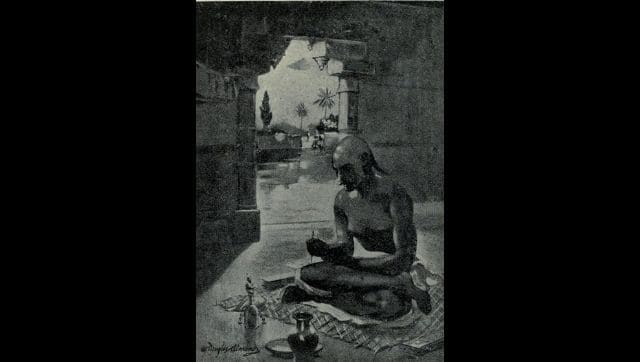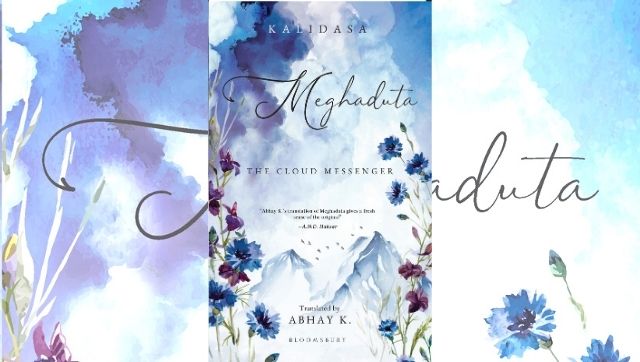Kalidasa’s Meghaduta_, composed circa 5th century is a Sanskrit poem that narrates the story of a Yaksha or a nature spirit who is separated from his wife and enlists the help of a_ megha (cloud) to send a message to her in Alakapuri, their home nestled in the Himalayas. The poet’s verses are steeped in viraha rasa or longing and create a poignant imagery of two lovers torn away from each other. But Kalidasa’s Meghaduta has been recognised and revered through the ages also for his deep understanding of nature, his knowledge of geography and his hold over the Sanskrit language. Multiple translations of this scholar’s work in several languages have made the poem accessible to people across centuries. However, in his 2021 translation, poet and editor Abhay K’s attempt is to approach Meghaduta with a contemporary lens. Not only does this mean a translation more attuned to the English language of the present but also an interpretation that captures the nuances of this poem as perceived in the modern world. The excerpt that follows is the translator’s Introduction to his work in which he describes how a poem titled Lockdown inspired by Kalidasa’s text in turn induced him to read this extraordinary work and take it upon himself to render a translation of the original Sanskrit in contemporary English.
***
The Guardian published a poem titled Lockdown by UK poet laureate Simon Armitage on 21st March 2020 about the coronavirus pandemic. It was influenced by Meghaduta or The Cloud Messenger of Kalidasa. The poem inspired me to read Meghaduta in Sanskrit and its various English translations. I had studied Sanskrit in my high school, which came in handy. My love for it has been growing since then and it has become part of my everyday life. World Catalogue shows 250 editions of Meghaduta so far in various languages. I chose to read the verse translation by HH Wilson published over 200 years ago in 1814, prose-poem translation by Col HA Ouvry in 1868, translation with exhaustive notes by Mallinatha published in 1895 and translation by Chandra Rajan published by the Sahitya Akademi in 1997. These are fine translations. However I felt that this breathtaking poem of 111 stanza needs to be presented to our millennial generation in a more contemporary language. The poem is about a Yaksha or an attendant spirit of Kubera, the Lord of Wealth, who is banished for a year in central India for neglecting his duties in the mythical city of Alaka, in the high Himalayas near Mount Kailasa. He pleads the cloud to be his messenger and take his message to his beloved young wife in Alaka. Meghaduta is full of detailed descriptions of flora and fauna of the Central and North India as well as of their hills, rivers, mountains, legends, beliefs, traditions, mythologies, rituals, high erotica among others. I have tried my best to preserve the names of the plants and animals, rivers, hills and mountains, traditions and styles, as in the original Sanskrit text of Kalidasa, providing their modern names in the note below each stanza in which they appear. I think it is very important to keep their original names lest we forget them and lose these treasures. Meghaduta creates a complete magical world in itself full of sylphs, nymphs, spirits, eight-legged animals, the wish fulfilling tree, various kinds of drums, celestial elephants, birds, rare flowers, fruits, plants and trees who help the cloud in his journey to deliver the Yaksha’s message to his beloved. [caption id=“attachment_9514791” align=“alignnone” width=“640”]  An artist’s imagination of Kalidasa composing his poem, Meghaduta. Image via Wikimedia Commons[/caption] The secret of Meghaduta’s continued relevance even today, in my view, rests on its focus on sensual love and nature’s beauty, the two subjects which are of eternal interest to us; and Kalidasa’s genius in making these two flow into each other. For example, who but Kalidasa can imagine the rivers as sensuous women, advising his friend, the cloud to take interest in the rivers along the way on his journey from the central Indian plains to the Himalayas— तस्याः किंचित्करधृतमिव प्राप्तवानीरशाखं हृत्वा नीलं सलिलवसनं मुक्तरोधोनितम्बम प्रस्थानं ते कथम अपि सखे लम्बमानस्य भावि ज्ञातास्वादो विवृतजघनां को विहातुं समर्थः॥४१॥ Like the slender arms of the lady river, Vanira branches reach out to take away her water garment and expose her thighs, the banks. O friend, of course it would take long for you to depart, for who has the strength to leave a woman after relishing her bare thighs? This love poem would be unimaginable without all the plants and fragrant flowers described in detail by Kalidasa. This is why Meghaduta should be of interest to the contemporary readers as we deal with biodiversity loss and climate change today. Can we use the imagery/idea of nature as a sensual being presented by Kalidasa in Meghaduta to transform how we see nature — from mother to beloved, from revering it to loving it and from being separate from it to being part of it? Can it help us in protecting nature if we start to see clouds, rivers, plants, trees and animals as sensual beings? Meghaduta also highlights the importance of flowers, plants, animals, seasons, rains, rainbows, winds, sun, moon, stars, stones, rivers, mountains among others things—animate and inanimate, in our love-life, without which we would gradually become bio-robots obsessed with numbers and statistics, dealing with various kinds of growth rates, and living a dismal life on a planet marred by loss of biodiversity and extreme climatic events. For example — गत्युत्कम्पादलकपतितैर्यत्रमन्दारपुष्पैः कॢप्तच्छेद्यैः कनककमलैःकर्णविभ्रंशिभिश्च । मुक्तालग्नस्तनपरिमलैश्छिन्नसूत्रैश्च हारैर् नैशो मार्गः सवितुरुदये सूच्यते कामिनीनाम् ॥ ६७ ॥ Where at dawn, the night-path of the amorous women are revealed by fallen Mandara flowers from their ringlets, golden lotuses torn, fallen from their ears, threads of their necklaces broken, pearls scattered, fragrant from the perfume of their breasts. I hope my translation of Meghaduta in contemporary English but staying true to the letter and spirit of Kalidasa’s Sanskrit original, gives you a taste of undiminished beauty and splendour of this classic poem written circa 5th century ce. I have also provided the original Sanskrit text. Lockdown across the planet has taught us to pay attention to our surroundings as Kalidasa has done in this exquisite poem, reminding us of all the beauty waiting to be discovered by slowing down, listening to birdsong, smelling the fragrance of flowers, reading books, thinking about our relationship with nature and how to tackle the three biggest challenges our planet faces today — biodiversity loss, climate change and environmental pollution. Bon Voyage with the Cloud!
***
The above excerpt from Abhay K’s translation of Kalidasa’s Meghaduta has been reproduced here with permission from the publisher Bloomsbury India


)
)
)
)
)
)
)
)
)



